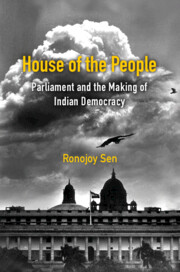Book contents
- Frontmatter
- Dedication
- Contents
- List of Illustrations
- Acknowledgements
- Introduction
- 1 The Road to Parliamentary Democracy: The Constituent Assembly and Its Prehistory
- 2 Protean Institution: The Changing Composition of Parliament
- 3 ‘Please Take Your Seat!’ Disruptions in Parliament
- 4 Inside Out: The Parliamentary Committee System
- 5 Corruption, Criminality and Immunity
- Conclusion
- Index
Conclusion
Published online by Cambridge University Press: 11 October 2022
- Frontmatter
- Dedication
- Contents
- List of Illustrations
- Acknowledgements
- Introduction
- 1 The Road to Parliamentary Democracy: The Constituent Assembly and Its Prehistory
- 2 Protean Institution: The Changing Composition of Parliament
- 3 ‘Please Take Your Seat!’ Disruptions in Parliament
- 4 Inside Out: The Parliamentary Committee System
- 5 Corruption, Criminality and Immunity
- Conclusion
- Index
Summary
Death is certain for anyone born, and birth is certain for the dead.
– Bhagavad Gita, 2:27Over the past two decades or so, debates about democratic regression and concerns about the future of representative institutions have been rife both in academic and popular discourse. There has also been a slew of books either predicting the death of democracy and representative institutions or at the very least raising serious misgivings about their future.
What Samuel Huntington had famously called the ‘third wave’ of global democratization, which had its beginnings in 1974, has peaked and seems to be in retreat. In 2006, according to Larry Diamond, 57 per cent of states with over 1 million population and 61 per cent of all states could be classified as democracies. Since 2006, however, the numbers have been declining and the rate of ‘democratic breakdown’ accelerating. In 2019, for the first time since the end of the Cold War, ‘the majority of states over one million population was not democratic, and also the first time that a majority of the world's people did not live in a democracy’. However, it is not just the numbers that are worrying for the health of democracy. Diamond notes that in the world's four largest democracies – the United States, India, Indonesia and Brazil – there has also been a dramatic deterioration of the quality of democracy. A prominent theorist of democracy points out, ‘Electoral participation is declining in many countries to historically unprecedented levels. Confidence in politicians, parties, parliaments, and governments is falling. Even the support for democracy as a system of government has fallen.’
Colin Crouch has also put forward the notion of a ‘post-democracy’ which he says describes
situations when boredom, frustration and disillusion have settled in after a democratic moment; when powerful minority interests have become far more active than the mass of ordinary people in making the political system work for them; where political elites have learned to manage and manipulate popular demands; where people have to be persuaded to vote by top-down publicity campaigns.
One of the notable aspects of the contemporary democratic breakdowns is that old-style coups or military dictators are not the cause. Steven Levitsky and Daniel Ziblatt argue that since the end of the Cold War, elected governments
- Type
- Chapter
- Information
- House of the PeopleParliament and the Making of Indian Democracy, pp. 276 - 299Publisher: Cambridge University PressPrint publication year: 2023

